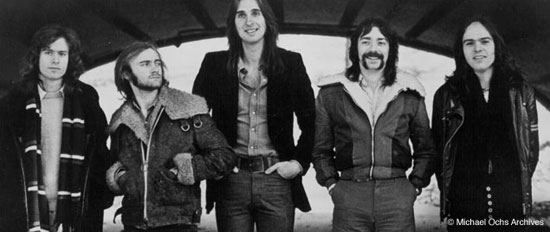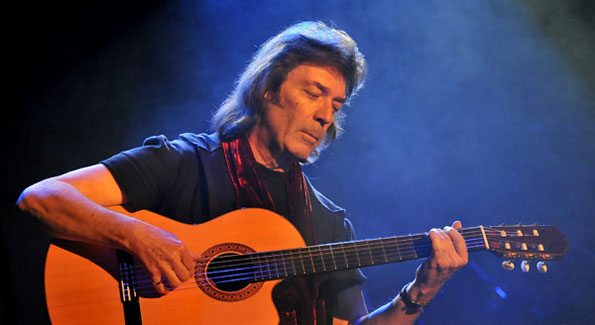Guitar virtuoso Steve Hackett brings back the music of the influential band he helped make famous.
It’s the late ’60s-early ’70s, a time of explosive and profound musical experimentation. The Beatles were leading the charge into “progressive” rock music and would inspire many of their peers to use both their expanding minds as well as new technology to create music that was uniquely powerful, that was new, that was, well, different.
“I was a huge Beatles fan, and they really set the template for what we called ‘progressive’ music,” says Steve Hackett, legendary guitarist for progressive rock kings Genesis from 1971 to 1977. “The most interesting period of the Beatles for musicians is basically ‘Revolver’ through ‘Sgt. Pepper’ through ‘Magical Mystery Tour.’ That was the golden period for production, ideas, the beginning of what was being called ‘progressive.’ Much of what followed with British music was in the wake of that. I owe a huge debt to the Beatles.”
But as Hackett remembers, the same people who were profoundly influencing him and his bandmates were also becoming their admirers during the same time period.
“Genesis has been through a number of incarnations, but that 1970s era truly inspired other musicians, not just rock musicians, but ones in other areas and in other genres,” Hackett said. “Back then, bands like Weather Report listened to us, and we listened to them. John Lennon even said he liked us. And it’s that era of the band that was really respected that I’m taking on the road.”
Hackett has taken the very best of the Genesis music from that influential period — a period where he helped mold the band’s sound and direction — and crafted it into a tour called “Genesis Revisited,” a concert experience that even the most diehard Genesis fans say is as good as the original band, if they were to get back together. Or maybe even better, given Hackett’s profound influence on the band during the seven years he was one of their driving forces, and also the fact that he hasn’t seemed to have lost even a step on guitar. The current incarnation of the show hits the Lincoln Theater this Wednesday night.
Hackett, 64, cites not only the Beatles but a diverse group of influences for helping shape his musical direction, from early on in his life, up to when he was a full fledged musician.
“Early on, I got hooked on two different kinds of music,” Hackett told me from his recording studio in England. “I listened to pop from a very very early age, and a bit later on I listened to a lot of classical music. I didn’t have any formal training, but my father played several instruments. Then I think when I was 12, I found myself listening to a lot of radio, some of it the work of pure genius, like the Everly Brothers, Roy Orbison, Del Shannon, The Shadows, The Ventures, and Jan and Dean and The Beach Boys. Of course The Beatles and the Stones. It all just took off for us in such a huge way.
“Then in 1965, I got to hear (classical guitarist Andres) Segovia play,” he continued, “and suddenly, that was another revolution for me. It’s a bit like going through the turnstiles and suddenly life was never the same again after I’d heard that. I was completely besotted by that. For many years I was learning these main three licks I was picking up, from Chuck Berry to Keith Richards and so on. I never imagined I’d be adopting the articulations and the harmonies like on the stuff from Segovia. Rock music started to amalgamate and change itself, and many bands had started to do things in the wake of what the Beatles had done.”
Hackett joined Genesis in 1971 after being approached by Peter Gabriel, who had seen Hackett’s “guitar for hire” ad in Melody Maker magazine, and he immediately made an impact on their sound with the release of the band’s ’71 album “Nursery Cryme.” Over the course of the next five years, he help define the band’s sound.

Genesis from left: Tony Banks, Phil Collins, Mike Rutherford, Steve Hackett and Peter Gabriel (Photo courtesy Genesis)
However, although he is very grateful for the time he had with the band, Hackett felt increasingly disposable. Much of his material was dismissed and his overall role diminished, largely by what he intimates were larger egos and a one-sided process.
“Being a part of taking the band from free shows and clubs to doing stadiums was pretty amazing,” Hackett said. “We managed to totally expand the fortunes of the band during a six-year period, 1971 through ’77. Six and a half years of my life were in the middle of that. I was really hot to keep the [momentum] flowing with Genesis but felt that the band wasn’t evenly balanced. I felt like I was kind of just another member of the band, just another guitarist. What I really felt like doing was to be a tad more virtuosic and collaborative. So I really don’t think I could have stayed with it. There were changes in the air, plus it was a bit easy to get into a confrontation, and things were just not solved democratically. But I was privileged to work with great, great people.”
Life after Genesis has been plentiful. Hackett has recorded several solo albums, formed a short-lived yet successful supergroup called GTR with Yes’ Steve Howe, and consistently took on side projects and guest spots while also embarking on different incarnations of the “Genesis Revisited” tour. Participating in a Genesis reunion has always been something that has been bandied about. Hackett’s been interested, but it has never come to fruition for him largely because of one main factor: Peter Gabriel’s involvement, or lack thereof.
“I was approached in 2005 to be part of the Genesis reunion,” Hackett said, “and for me, it was going to be both Peter Gabriel and myself, or it wasn’t going to happen. That was a condition made to the other guys. But there was no real offer. I mean I’ve been extremely flexible about this, but I might be waiting a lifetime and it may never happen. I actually saw Mike and Tony last week at a lunch for Mike’s biography, and I asked them if they were going to reform with Phil, and both of them said, ‘Oh I don’t know, doesn’t look like it.’ So they don’t even know any more than I do.
“But that’s part of the reason that I decided to go out and play what I thought was the best music of the band, during those early years, and when I play these concerts,” Hackett continued. “I get feedback from people about songs they absolutely adore, so I’ve made that the music of “Genesis Revisited.” And it’s been a tremendous thing.”
Hackett has stayed vital and active, playing both his own music and that of his epic band, and his revered guitarist status remains intact. And even though he is bringing that classic old Genesis music to fans all over the world on this current tour, he says he is on an even bigger quest, one he seems firmly dedicated to.
“Seems to me that music’s gotta broaden out, and if I’ve got a mission in life, it’s to rid people of prejudice against all the things they think they don’t like. So that’s my calling,” he said.
Steve Hackett’s “Genesis Revisited” Tour; March 26, 2014, 7 p.m.; Lincoln Theater, 1215 U St. NW. $45-$65 available here.
Steve Houk writes about local and national music luminaries for WashingtonLife.com and his own blog at midliferocker.wordpress.com. He is also lead singer for the classic rock cover band Second Wind.

